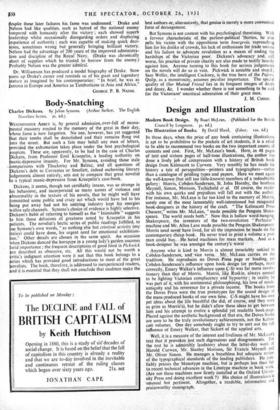• Body—Snatching WESTMINSTER ABBEY is, by g eneral admission, over-full of
monu- leontal masonry erected to the memory of the great in their day, hose fame is now forgotten. No one, however, has yet suggested at their tombs shall be demolished and their remains flung out to the street: But such a fate may befall any man of letters, vided the exhumation takes place under the best psychological uspices. These are, apparently, to be had in the case of Charles ickens, from. Professor Emil Kraepelin, a leading authority on anic-depressive insanity. For Mr. Symons, avoiding those stale omparisons with Thackeray and Balzac, and all questions of rickens's debt to Cervantes or Smollett, indeed eschewing literary judgements almost entirely, sets out to compare that great novelist o a typical manic-depressive from Kraepelin's case-book. Dickens, it seems, though not certifiably insane, was so strange in his behaviour, and incorporated so many scenes of violence and toebnormality in the texture of his novels, that he might well have committed some public and crazy act which would have led to his being put away had not his untiring industry kept his energies tvithin safe channels. Symons's choice of evidence is highly selective. Pickens's Habit of referring to himself as the " Inimitable " suggests to him those delusions of greatness noted by Kraepelin in his rtients. The novelist's hectic series of public readings fulfilled, to Symons's own words, " as nothing else but criminal activity (my talics) could have done, his urgent need for emotional exhibition- sm." Other details ate chosen in the same spirit. An occasion hen Dickens danced The hornpipe in a young lady's garden assumes leurid importance ; the frequent descriptions of good food in Pickwick re described as obsessive, etc. All this would not be worth a ritic's indignant attention were it not that this book belongs to a ries which has provided good introductions to most of the great ovelists. The book, therefore, is addressed to inexperienced readers, nd it is essential that they shall not conclude that madmen make the best authors or, alternatively, that genius is merely a more convenient form of derangement. - But Symons is not content with his psychological theorising. With a fervour characteristic of_ the parlour-political 'thirties, he also pelts his victim with the opprobious term bourgeois, reproaching him for his dislike of crowds, his lack of enthusiasm for trade unions and his failure to advocate revolution as a means of ending the hardships of the Victorian poor. Dickens's advocacy and, still worse, his practice of private -charity are also made to testify heavily against him. Anyone turning to this book for serious judgements on the novels will do so in vain. Pickwick is amiable and stupid; Sam Weller, the intelligent Cockney, is the true hero of -the Papers. Quilp, as a monstrosity, assumes peculiar importance. The special quality of Our Mutual Friend lies in its frequent images of death and decay, &c. I wonder whether there is not something to be said for the Victorians' uncritical admiration of their great men.
J. M. COHEN.


































 Previous page
Previous page